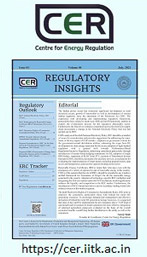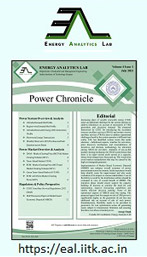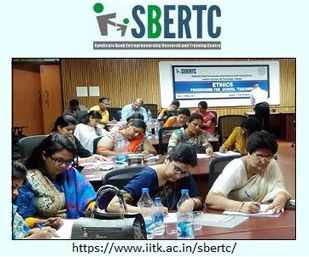|
||||||
 |
The students develop the capacity for free and objective enquiry, courage and integrity, awareness and sensitivity to the needs and aspirations of the society. The program is designed to impart knowledge, and strengthen concepts and intellectual skills through course work, seminars and project/thesis work and thus cater to the needs of Industry, R&D Organizations and the Educational institutions. The program is designed to prepare students to enter their professions with a perspective and breadth of knowledge related to the principal divisions of their respective fields of specialization through courses and research experience. The Department of Industrial and Management Engineering at IIT Kanpur teaches management methods, techniques and skills relevant to the students with diverse backgrounds who may wish to subsequently pursue a career in Management, R&D or Academics. Research covers all the areas of management including Economics, Infrastructure and Public Systems; Finance and Control Systems; Information and Knowledge Systems; Management of Innovation and Entrepreneurship; Marketing Management; Operations Management; Operations Research and Quantitative Methods; Organizational Behavior and Human Resource Development; Strategic Management and Business Policy. |
|||||
|
||||||
 |
IME 602 : PROBABILITY AND STATISTICS , 3-0-0-4Axioms of probability, Conditional probability, Discrete and continuous random variables, functions of random variables, Expectations of random variables. Jointly distributed random variable. Descriptive and inferential Statistics, Estimation of parameters, Test of hypothesis, Analysis of variance, Regression analysis, Introduction to statistical Packages. IME 603 : INTRODUCTION TO COMPUTING 2-0-3-4Computing - Computer organization, Number systems - Data representation, Data structures like arrays, stacks, queues and trees, Algorithms for searching and sorting, Complexity file processing, Structured Programming, Lab exercises on data structure, algorithms and file management using any appropriate language. IME 604 : MANAGERIAL ACCOUNTING FINANCE AND ECONOMICS 3-0-0-4Financial Accounting, conventions, Balance sheet concepts, profit and Loss account, Accounting mechanics, Basic records, Preparing financial statements, Adjustment entries, Inventory valuation financial rations, Sources of funds, Cost of capital, Cash Flow statements, Simulation of cash flow, Cost accounting, Cost classification, Allocation and absorption of cost, Relevant costs, Allocation joint costs, Design of historical and standard costing systems, Overhead cost control, Managerial Economics concept, Demand theory and demand assessment, Cost functions, Effect of plant size on cost, Production Functions and their estimation, Market structure and price, Capital budgeting. IME 605 : OPERATIONS RESEARCH FOR MANAGEMENT 3-0-0-4Introduction Mathematical Modeling, Linear programming - Formulation, solution procedures, Duality, Sensitivity, Applications, Network methods - Max Flow, Min cost, Shortest path, Dynamic programming - Sequential decisions, Principle of optimality Applications Integer programming - Formulation, Nonlinear Programming - Applications and solution methods. IME 624 : COMPUTER AIDED DECISION SYSTEMS 2-0-0-4, Prereq. IME 605 or equivalentSystem Analysis : Information System Analysis and Design, Decision Support System, Database Management Systems, Query Languages, Emerging Areas like communication network distributed systems and knowledge based systems, Simulation; Methodology Approaches, Programming Considerations, Languages and Data Structures, Statistical Considerations, Validation, Simulation Languages, Applications. IME 632 : NETWORK FLOWS ALGORITHMS 3-0-0-4, Prereq. IME 605 or equivalentGraph nations and computer representations; Applications to various disciplines; Worst-case complexity; Shortest paths; label setting and label correcting algorithms; Maximum Flows; augmenting path and preflow-push algorithms; Minimum cost flows; pseudopolynomial and polynomial-time algorithms; Assignments and matching; Minimum spanning trees; Convex cost flows; and Generalized flows. Emphasis on real-life applications of network flows and state of the art algorithms. IME 633 : COMBINATORIAL OPTIMIZATION 3-0-0-4, Prereq. IME 605 or equivalentComplexity of algorithms, Polynomial problems - shortest path, Spanning tress, Sequencing, Max flow, Matching, Linear Programming, (Khaciyan's algorithms), NP-hard problems - Knapsack, Travelling Salesman, Vertex Packing, Sequencing problems, Set-covering and other Integer programming problems, Matroid Intersection problem. Analysis of Heuristics. Data structure for combinatorial optimization problems. IME 641 : DESIGN OF PRODUCTION SYSTEMS 3-0-0-4Production systems : concepts and integrated view, Policy Decisions, Capacity planning, Product development, Plant location, Plant layout, Materials handling, Assembly line balancing, Work design, Methods engineering, Human Factors engineering, Project Management and Network models, Recent trends IME 642 : OPERATIONS MANAGEMENT 3-0-0-4Overview of Manufacturing Planning and Control; Forecasting; Smoothing Methods, Time Series Analysis, Decomposition Methods. Autoregressive and Box Jenkins Models. Qualitative Models; Aggregate Production Planning, Master Production Scheduling. Capacity Planning. Demand Management. Scheduling; Performance Measures, Single Machine Models, Flow Shop and Job Shops, Dynamic Scheduling, Evaluation of Heuristics and Dispatching Rules. IME 647 : QUALITY ASSURANCE AND TAGUCHI METHODS 3-0-0-4Quality Assurance and TQC, Basic statistical concepts, Control of Accuracy and Precision, Shewhart Control Charts for Process Control; Xbar, Range, p, np, c, and u charts, CUSUM chart, subgroup selection, Process Capability, ISI standards on control Charts, Process diagnosis using runs, Cause-Effect and Pareto diagrams; Acceptance Sampling plans, IS 2500, MIL-STD-105D, Continuous sampling Plans, Sequential Sampling; Effect of Inspection Errors on QA, ISO 9000; Review of Design of Experiments, Quality Engineering; System, Parametric, and Tolerance Design, Process Optimization and Robust Product Design using Orthogonal Arrays, Taguchi Loss Functions, Manufacturing Tolerance Design Course will include software applications and industry case studies IME 654 : MANAGEMENT OF RESEARCH & DEVELOPMENT 3-0-0-4Types of technological change, Their inter-relationships, R&D environment in India, Process of innovation, R&D as an element of corporate strategy, Technological forecasting, Technology assessment, Project selection and evaluation, Structure of organization for R&D in Indian firms and in Govt. research laboratories, Perception and Motivation of R&D employees, Leadership styles in R&D, Effect of organizational climate on R&D, Creativity, Blocks to creativity, Improving creativity. IME 656 : MANUFACTURING POLICY 3-0-0-4Introduction to Management and Corporate Strategy, Manufacturing policy, Capacity Planning and Facility Choice, Formulating and Implementing Manufacturing Policies, Technology-Strategy Linkage, Evaluation of Manufacturing Strategies, Case Studies. IME 657 : INDUSTRIAL POLICY & TECHNOLOGY MANAGEMENT 3-0-0-4Policy-Technology Choice : Linkage; National Technology Policies; Technology, Competition and Industrial Structure; Formulating a Technology Strategy; Technology Development and Acquisition process; Managing Technologies, Technology in Indian Industries, Technology Development Process; Strategic R&D Management and Technological Consortia; Technology Acquisition Process; Licenting and Joint Ventures, Managing Technology Spillovers; Justification of new Technology; Management Accounting and Technology; Integration of New with Old Technology; Assimilation of Technology; Intellectual property Rights and Implications for Industry Policy and Technology Management. IME 661 : DESIGN OF ORGANIZATIONS 3-0-0-4Introduction to organizations and evolution of organization theory, Organization structure, Organization environment and culture, values and organizations as institutions Power and politics in organizations, organization conflict and change, organizational restrictions, Learning organizations and organization effectiveness. IME 671:MANAGING SOFTWARE PROJECTS 3-0-0-4This course will cover the techniques for managing software projects. It is intended to give the students both knowledge about, and practical experience in, the design and development of production quality software. The techniques taught in the class will be applied to a substantial team project. Course topics will be as follows: Software Process; Software Configuration Management, CMM Levels, Software Project Planning and Costing; Requirements Engineering; Software Project Design; Testing; Software Metrics; Quality, Software Project Management; Human Factor. IME 681:COMPUTER - INTEGRATED MANUFACTURING SYSTEMS 3-0-0-4Fundamental of Automation in Manufacturing, Functions and Components of CIMS; Software Technology-DBMS, Expert Systems, Simulation; Quantitative Methods; Classification and Coding; Group Technology; NC Machines and Part Programming; Computer-Aided Process Planning; Process Control; Automated Materials Handling-Robots, Conveyers, AGVs; Automated Quality and Inspection; Flexible Manufacturing Systems-Planning and Scheduling; Factory Areas Networking, Factory of the Future. IME 682 : FLEXIBLE MANUFACTURING SYSTEM 3-0-0-4Flexible Automation - An Overview, Integrated Manufacturing Modeling and FMS, Flexibility Measures, Hardware Components, Control Components, System Planning and Design Problems, Aggregate Production Planning for FMS, Process Planning, Scheduling, Loading and Routing, Simulation of FMS, Communication and Networking, Economic and Technological Aspects, Management Issues. IME 683 : INTELLIGENT MANUFACTURING SYSTEMS 3-0-0-4Introduction to Expert system : Introduction to Artificial Intelligence, Expert Systems Overview; Development of Expert Systems; Problem Presentation, Expert System Structure, Knowledge Bases and Representation, Inference Mechanism, Probability and Fuzzy Logic, User Interface, Development Cycle, Expert System Development tools, Introduction to PROLOG; Syntax and operations, Data Structures, Backtracking and Cut, Input-Output, Predicates, Logic; Classes and Expert System Approaches; Analysis, Design Planning and Object-Oriented Systems in Manufacturing; Systems in System Design; Equipment Selection, Layout Design, Materials Handling, Capacity Planning; Systems in Product Design and Development; Product Design, Feature Extraction and Recognition, Bar Codes and Coding of Components; System in Manufacturing Planning, Scheduling and Control; Group Technology, NC Part Programming, Process Planning - Generative and Variant, Production Planning, Resource Scheduling, Automatic Storage and Retrieval, Robot Trajectory Planning, Inspection; Applications Exercises; Exposure to Expert System Shells and Packages, Manufacturability Evaluation, Mini Projects. IME 698 : SEMINAR 0-0-0-0IME 799 : PH D THESIS |
 |
||||
|
||||
|
All the articles (viz. Book Chapters, Journal Articles and the Conference Proceedings) published by our Ph D scholars will be uploaded shortly on this space.
|
 |
|||
|
||||||
 |
IME LabThe Department of IME has a separate lab facility of its own. The lab is available 24x7 to all the students of the department. The lab owns a total of 81 computers assigned for various tasks. There are 63 P-4 systems out of which 11 are project PCs; 18 P-3 systems with 8 project PCs inclusive; 1 Compaq ML3S0G3 series server.
|
 |
||||
 |
IME Library:In order to update the students and faculty with latest developments, IME Department at IIT Kanpur provides them with a vast database of information in the form of periodicals, journals, CDs, Magazines, Machine readable databases, Technical reports, books, and online resources in central and departmental library. |
|||||
 |
Conference Room:Our Department has a modern Conference room equipped with state-of-the-art presentation theatre.
|
|||||
|
||||||
 |
|
 |
||||
|
||||
|
The Department of Management Sciences (DoMS) at Indian Institute of Technology Kanpur (IIT Kanpur), INDIA was established with the aim of synergizing technology with management in a comprehensive manner so that the knowledge gained may be used for the benefit of the society at large. The journey started in 1988 with the Ph.d and M.Tech programmes, and in 2001 the department introduced the MBA programme. The focus of the department is to develop techniques and the skills sets relevant to students with diverse backgrounds, and who may wish to subsequently pursue a career in academics or in different technical and managerial positions in Department of Management Sciences related industries. The department covers a whole gamut of areas in Department of Management Sciences, that includes Operations Research, Operations Management, Production & Supply Chain Management, Quantitative Methods & Decision Making, Marketing/Services Management, Business/Social Media Analytics, Innovation & Entrepreneurship, Organizational/Human Resource Management, Business Economics, Infrastructure & Public Systems, Financial Markets and Models, Enterprise Information and Knowledge Systems, etc.
|
||||























